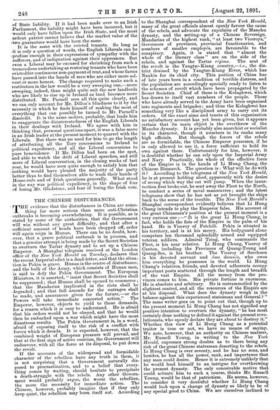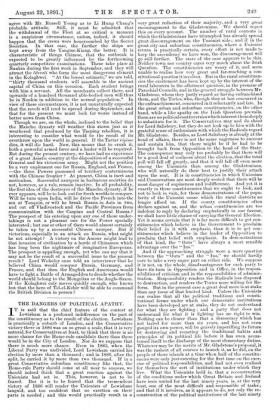THE CHINESE DISTURBANCES.
THE evidence that the disturbances in China are some- thing far more serious than mere anti-Christian - outbreaks is becoming overwhelming. It is possible, as is stated by some of the authorities, that the Government will win without any great difficulty, and that after a - sufficient amount of heads have been chopped off, order • will again reign in Hunan. There can be no doubt, how- • ever, that a grave political outbreak is in process, and that a genuine attempt is being made by the Secret Societies to overturn the Tartar dynasty and to set up a Chinese Emperor. A Shanghai telegram received at the London office of the New York Herald on Tuesday, declares that the recent Imperial edict is a dead-letter, and that the situa- tion in Pekin is grave. Hunan is the centre of disturbance, and the bulk of the Army, which consists of Hunan men, is said to defy the Pekin Government. The European Ministers, it is asserted, " insist that Secret Societies shall be suppressed ; that Hunan shall be opened to commerce ; that the Mandarins implicated in the riots shall be -degraded ; and that full amends for the outrages shall be made, and assurances given for the future,—or the Powers will take immediate concerted action." The Emperor, however, objects to yield to these demands, for a reason which it is easy to understand. He is afraid that his orders would not be obeyed, and that he would then be embarked upon a war which might have the most disastrous results. The Pekin Government is, in a word, afraid of exposing itself to the risk of a conflict with forces which it dreads. It is expected, however, that the combined weight of European pressure will prevail, and that at the first sign of active coercion, the Government will endeavour, with all the force at its disposal, to put down the revolt.
If the accounts of the widespread and formidable eharacter of the rebellion have any truth in them, it is not surprising that a Government naturally dis- posed to procrastination, and to a belief that every- thing comes by waiting, should hesitate to precipitate a death-struggle with the rebels. Any other Govern- ment would probably argue, the worse the rebellion, the more the necessity for immediate action. The Chinese, however, probably imagine that if they only ,keep quiet, the rebellion may burn itself out. According to the Shanghai correspondent of the New York Herald, many of the great officials almost openly favour the cause of the rebels, and advocate the expulsion of the Manchu dynasty, and the setting-up of a Chinese Sovereign. Mandarins of the highest rank, " at least two Viceroys," Governors of provinces, provincial functionaries, and numbers of smaller employes, are favourable to the conspiracy. Again, it is stated that " almost the whole of the literary class " are on the side of the rebels, and against the Tartar regime. The seat of the revolt is the Yangtse-Kiang country,—i.e., the dis- trict drained by the Yangtse-Kiang River, which has Nankin for its chief city. This portion of China has of late years been in a condition of terrible distress, and the population are accordingly specially ready to listen to the schemes of revolt which have been propagated by the Secret Societies. Chief of these is the Kolaghwei, which has drawn to itself vast numbers of the people. Those who have already served in the Army have been organised into regiments and brigades ; and thus the Kolaghwei has something very like a disciplined army to carry out its orders. Of the exact aims and tenets of this organisation no satisfactory account has yet been given, but it appears certain that its main object is the overthrow of the Manchu dynasty. It is probably also anarchist or socialist in its character, though it numbers in its ranks many high officials. But though the forces of the rebels are so formidable, the Chinese Emperor possesses, if he is only allowed to use it, a force sufficient to hold its own against them. Unfortunately for him, however, it is doubtful whether he can rely upon the Imperial Army and Navy. Practically, the whole of the effective force of the Empire is in the hands of Li Hung Chang, the Chinese Bismarck. The question is : What will he do with it? According to the telegrams of the New York Herald, he is at present holding aloof, apparently with the desire of seeing which way the cat will jump. When the insur- rection first broke out, he sent away the Fleet to the North, to conduct a series of naval manoeuvres ; and the latest telegrams show that he has not as yet brought the ships back to the scene of the trouble. The New York Herald's Shanghai correspondent evidently believes that Li Hung Chang intends to play the Emperor false. His account of the great Chinaman's position at the present moment is a very curious one :—" It is the great Li Hung Chang, in fact, who holds the fate of the Empire in the palm of his hand. He is Viceroy of Petchili. Pekin is situated in his territory, and is at his mercy. His bodyguard alone comprises ten thousand splendidly armed and equipped veteran soldiers. Admiral Tzing, who commands the Fleet, is his near relative. Li Hung Chung, Viceroy of Canton, including the Provinces of Quang-Toung and Quang-See, is his brother. The Viceroy of Szechuen is his devoted servant and dme clamnee, who owes him everything he possesses in the world. Li Hung Chang's relatives, friends, and devoted adherents occupy important posts scattered through the length and breadth of the vast Empire. All the money from the pro- vinces comes to him. His private fortune is enormous. He is absolute and arbitrary. He is untrammelled by the slightest control, and all the resources of the Empire are at his disposal. What does the dynasty weigh in the balance against this experienced statesman and General ? " The same writer goes on to point out that, though up to the present moment Li Hung Chang has not signified any positive intention to overturn the dynasty, " he has most certainly done nothing to defend it against the present revo- lutionists, who openly declare they are about to destroy it." Whether this view of Li Hung Chang as a potential traitor is true or not, we have no means of saying. We note, however, that an authority on Chinese matter., Mr. Russell Young, in writing to the New York Herald, expresses strong doubts as to there being any risk of the great Chinese statesman deserting to the rebels. Li Hung Chang is over seventy, and he has no sons, and besides, he has all the power, rank, and importance that any man could desire. Hence it is extremely unlikely that he would lend himself to an intrigue for overthrowing the present dynasty. The only conceivable motive that could actuate him to such a course, thinks Mr. Russell Young, would be that of patriotism. He seems, however, to consider it very doubtful whether Li Hung Chang would look upon a change of dynasty as likely to be of any special good to China. We are ourselves inclined to agree with Mr. Russell Young as to Li Hung Chang's probable attitude. Still, it must be admitted that the withdrawal of the Fleet at so critical a moment is a suspicious circumstance, unless, indeed, it should happen that the crews were honeycombed by the Secret Societies. In that case, the further the ships are kept away from the Yangtse-Kiang, the better. It is characteristic of things Chinese, that the outbreak is expected to be greatly influenced by the forthcoming quarterly competitive examinations. These take place at Nankin during the first week in September, and they will attract the literati who form the most dangerous element in the Kolaghwei. " At the lowest estimate," we are told, " thirty thousand students will assemble in the ancient capital of China on this occasion. Each student brings with him a servant. All the merchants collect there, and upwards of a hundred thousand able-bodied men will thus be in Nankin in addition to the normal population." In view of these circumstances, it is not unnaturally expected that the revolt will tend to spread during September, and that for the present we must look for worse instead of better news from China.
Though we are, on the whole, inclined to the belief that the Manchu dynasty will weather this storm just as it weathered that produced by the Taeping rebellion, it is interesting to consider what would be the result of its overthrow upon the world in general. If the Tartar regime dies, it will die hard. Now, this means that to crush it, both a powerful armed force and a leader will be required. But during the present century, we have had no experience of a great Asiatic country at the disposition of a successful General and his victorious army. Might not the position be a very unpleasant one for Russia, England, and France, —the three Powers possessed of territory conterminous with the Chinese frontier ? At present, China is inert and motionless. Successful usurpers in barbarous societies do not, however, as a rule, remain inactive. In all probability, the first idea of the destroyer of the Manchu dynasty, if he ever appears, will be to look out for fresh worlds to conquer. Will he turn upon India, will he drive the French into the sea at Tonquin, or will he break Russia in Asia in two, and cut off Vladivostock and the Pacific Provinces from communication with the Caspian and Central Russia ? The prospect of his entering upon any one of these under- takings is not a pleasant one for the Power specially interested ; but one or other of them would almost certainly be taken up by a successful Chinese usurper. But if victorious, especially in an attack on Russia, what might he not attempt ? A victory on the Amour might lead to that invasion of civilisation by a horde of Chinamen which has long been the nightmare of imaginative Europeans. The prospect is appalling enough, yet who can say that it may not be the result of a successful issue to the present revolt ? Lord Wolseley once told an interviewer that he believed China would conquer Russia, Germany, and France, and that then the English and Americans would have to fight a Battle of Armageddon to decide whether the world should belong to the Mongolian or the Anglo-Saxon. If the Kolaghwei only moves quickly enough, who knows but that the hero of Tel-el-Kebir will be able to command the British Division in person ?



































 Previous page
Previous page